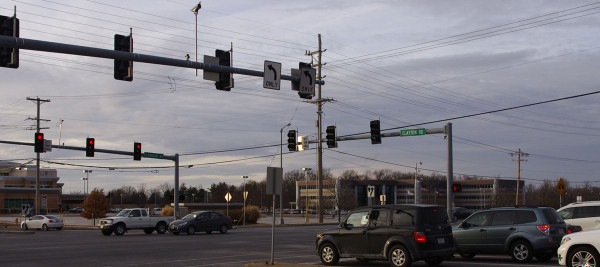Red Light Cameras ruled unconstitutional
In the latest challenge to red light cameras in Missouri, the Eastern District Court of Appeals ruled Dec. 17 that the City of Arnold’s red light camera ordinance violates the Missouri Constitution and state law. This ruling follows a similar one by the same court Nov. 5 which declared Ellisville’s ordinance contrary to state law on two counts.
According to the Ellisville website, the city puts red light cameras at select intersections with a high number of accidents/or fatalities.
Ryan Keane of the Simon Law Firm, attorney for the plaintiffs in both cases, said these rulings are a positive step for Missouri.
“Smart judges took their time to come to the best decisions possible,” Keane said. “I’m proud of the time and energy that the Appellate Court judges put into this.”
Both the Arnold and Ellisville ordinances were deemed contrary to state law for failing to assess points on an offender’s license for a moving violation, although both cities called red light signal violations non-moving. In the Ellisville ruling, the judges said a 2011 case in Creve Coeur affirming an ordinance that did not assess points was “overruled and no longer good law.”
“It’s a great decision,” Keane said of the Ellisville ruling. “It’s illogical to say it’s not a moving violation; your car is moving. It was kind of a long shot; it’s rare for one court of appeals to overrule another.”
Keane also said red light cameras ordinances are enacted not for road safety, but as revenue generation for cities, an idea that was explored, but not ruled upon in the Ellisville case.
“With red light cameras, accidents and injuries are more likely,” Keane said. He added that yellow light timing is very important, and said several studies have shown yellow light times have been manipulated in some areas to increase the number of red light tickets.
Ed Dowd Jr., an attorney for American Traffic Solutions (ATS), the company Ellisville and Arnold contract to provide their red light cameras disagrees with the legal reasoning behind both rulings.
“Red light camera safety systems save lives,” Dowd said. “I hope the Missouri Supreme Court will take one of these cases. I think they will because you have 30 different cities in Missouri with red light cameras and many types of ordinances.”
Dowd said no ordinance ought to address the assessment of points, as that is a matter appropriately left to the Missouri Department of Revenue. However, he said the State Supreme Court-nominated Office of State Court Administration recommended that red light signal violations be non-points.
“The ordinance shouldn’t say anything about points,” Dowd said.
Under Arnold’s ordinance, ruled unconstitutional, a vehicle owner is prosecuted for red light violations, but is allowed a rebuttable presumption in case someone else was driving the car in order to prove they were not the driver. According to the December ruling, such a hearing is criminal, and under the Missouri Constitution, the burden of proof must rest on the prosecution in criminal proceedings.
Dowd said he disagrees with the ruling, which he said was actually unprecedented.
“It’s a really new way of looking at this,” Dowd said. “Historically these have been civil violations. They said the city council didn’t say it was civil, and they probably should have, but I think it’s really based on erroneous reasoning.”
Dowd said the Arnold case has worrying applications far beyond red light cameras and ATS, including making it nearly impossible to enforce any city ordinance.
“Say you have an ordinance that says you can’t have shutters falling of your house. Usually you’ll come in to the court and say ‘I fixed the shutters, will you drop it’ and they do,” Dowd said. “But now, with this last decision, they can skip circuit court, go straight to the municipal court and file a class action- ‘you can’t do this it’s a criminal proceeding.’ So it makes it very difficult to enforce anything.
Judges found a similar conflict with state law in the Ellisville case, where owners are always prosecuted for red light signal violations. The panel ruled that this goes against Missouri law, which states that traffic rules apply to “drivers of vehicles and pedestrians,” rather than vehicle owners.
While Keane agreed with the judges, Dowd said the Ellisville ordinance isn’t in conflict with state law, and merely adds vehicle owners to the list of people to whom traffic rules apply.
Mo Vanacht, senior, said she’s never had a red light signal violation and the cameras are an important tool for law enforcement.
“If you’re not following traffic laws and putting people in danger, you deserve to deal with the consequences,” Vanacht said.
She said the Ellisville and Arnold rulings made sense, but she was still disappointed that the municipalities will be unable to use the cameras under their current ordinances.
“I agree with the ruling, I just think it’s unfortunate that something like red light cameras is keeping people safe and we can’t find a way to write the laws so it actually works.”
Ellisville is still collecting violator data with red light camera in case a higher court rules that it’s ordinance is legal, but is not issuing notices of violation at this time.
Your donation will support the student journalists of Marquette High School. Your contribution will allow us to purchase equipment and cover our annual website hosting costs. You may become a PATRON by making a donation at one of these levels: White/$30, Green/$50, Blue/$100. Patron names will be published in the print newsmagazine, on the website and once per quarter on our social media accounts.




